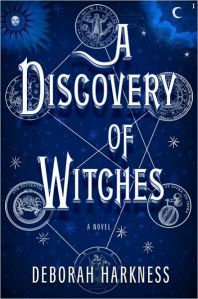My epic problem
 Last week, while home from work with a sore throat, I spent the whole day reading the new highly-touted novel, A Discovery of Witches by Deborah Harkness. I liked it, as did the folks at Publisher's Weekly and Booklist (which gave it a starred review). Even more impressively, it showed up at number 2 on the New York Times' hardcover fiction bestseller list in its first week -- nice to see a first-time novel by an English professor up there in Patterson/Larsson land.
Yet. Toward the end, I found myself racing through -- not quite skimming but definitely not paying close attention. This is a bad habit of mine, especially if I'm reaching the end of a book at the end of the day and know I won't be able to sleep until it's done. But I found myself also getting a tad annoyed and I realized what that was about.
Last week, while home from work with a sore throat, I spent the whole day reading the new highly-touted novel, A Discovery of Witches by Deborah Harkness. I liked it, as did the folks at Publisher's Weekly and Booklist (which gave it a starred review). Even more impressively, it showed up at number 2 on the New York Times' hardcover fiction bestseller list in its first week -- nice to see a first-time novel by an English professor up there in Patterson/Larsson land.
Yet. Toward the end, I found myself racing through -- not quite skimming but definitely not paying close attention. This is a bad habit of mine, especially if I'm reaching the end of a book at the end of the day and know I won't be able to sleep until it's done. But I found myself also getting a tad annoyed and I realized what that was about.
It's the "Wait, there's more!" syndrome, commonly seen in action/epic movies (Wyatt Earp and The Dark Knight come to mind) where there is just one denouement/near death experience/ultimate showdown too many. Or three.
I realize that's kind of the point of an epic book like this one -- and it's the first part of a trilogy so there's more to come. But after awhile, especially in a single volume, it starts to feel like Too Much. This is the reason I've given up on Diana Gabaldon's Outlander series. Each single volume just involves too many James Bondish escapes. Even in a fantasy where you've suspended disbelief (time travel and all that not to mention a brawny, sexy Scotsman who's also really smart and thoughtful, too), it's asking too much to follow these characters through yet another traumatic event. I think if you're going to follow the same people on epic adventures it helps to break it down into more digestible episodes like your standard mystery or thriller series. And one of the geniuses of Patrick O'Brien's Aubrey-Maturin series, I realize now, is his ability to take us along on extended periods where nothing much actually happens, plotwise, but we're still enthralled by just hanging out with those characters in those settings.
I feel the need here to repeat that I really did like Harkness' book -- which contributed the new (to me, at least) feature of supernatural beings doing yoga together as well as great European settings and the always-alluring enticement of ancient secrets hidden in an old book in the archives of the Bodleian Library. This book, like Justin Cronin's blockbuster from last year, The Passage, (which I also read and liked but felt a little annoyed at its super-hype) is getting a lot of props as a sort of genre/literary hybrid, although the vampires in A Discovery of Witches are more traditional dangerous romantic hero types, not the viral predators of The Passage. I rated A Discovery of Witches 3 1/2 stars on LibraryThing which is my standard "enjoyable read" rating and I will probably read the next installment. The fact that I'm spending so much time thinking about this book indicates that it's good, good enough to stay inside my head for a bit. And I am glad to see a non-Patterson-violent-male thriller book up there selling well. As the review in the Miami Herald pointed out, Harkness's book uses elements from fantasy, romance and historical fiction, and I'm all for all those genres getting more play.
Maybe it's the English major in me, or the romance reader, but the parts I like best about these books are the characters and their idiosyncracies. I know you need lots of action to keep people interested and I know if you're talking about some kind of supernatural showdown there has to be lots of conflict with lots at stake. I just hope Harkness, Cronin and others (I'm sure their success means there will be tons of others) trust their readers, and themselves, to know that we're reading these stories for more than just one more Incredible Cheating of Death.
